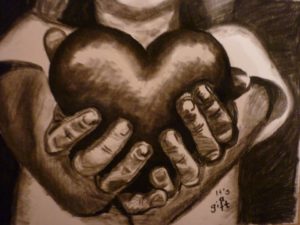We have looked into the characteristics of a powerful person as a key to healing from the effects of relational trauma and a victim mentality. Learning self-control by using our free choice, boundaries and assertiveness leads to healthy relationships. We are managing our own freedom while allowing others to be free as well. It creates an interpersonal environment that acts like a greenhouse for love.
‘Love’ is a big word and hard to grasp, but it is made of other concepts that might be easier to recognize.
Freedom is a fundamental condition for love. Without it, nothing is growing.
The fruit of love we can experience in our life are
- a sense of safety with a person
- trust
- an absence of fear in the relationship/less anxiety in general
- security about the relationship
- no pressure
- stability
- intimacy
- deep knowing of each other
- appreciation&affection
- honor&respect
- hope&faith in the future
- courage
- support
- comfort
- care
- peace
- …
- …
We grow all these things by living like a powerful person and having powerful relationships.
Giving and taking
It only feels like love when it is freely given. Other people notice when we give reluctantly because we are incapable of saying ‘no’ to their request. We can sense when something was given with hidden resentment.
The same is true for anything we are giving from a place of self-sacrifice. Sacrifices are not love, they are gross. And painful. And the subtle sense of pain that is mixed into self-sacrifice will hinder others and ourselves from feeling love within the exchange. The opposite of self-sacrifice is self-care. It makes sure that we have something to give for a very long time. When we manage our resources well, we are better able to support others.
The freedom to say ‘no’ creates a sense of safety within us. It is through this experience of respect that we can learn trust.
 When we learn to express our needs directly, it takes pressure from our relationships. Our partners will not have to guard themselves against powerless tools like manipulation or intimidation. So every exchange will be free and without burden.
When we learn to express our needs directly, it takes pressure from our relationships. Our partners will not have to guard themselves against powerless tools like manipulation or intimidation. So every exchange will be free and without burden.
It also means that our friends won’t have to guess our needs any longer. The time of small hints and hidden messages is over. We can just say what we need. It increases the chance that needs are actually met.
It gives our friends a better focus on how to help us, which results in a better quality of help.
But more than all that, when we express a need and it is met, we will know that they really meant us. It wasn’t a vague exchange in the air, which is what manipulation feels like. It was between two visible, tangible people. This experience is incredibly healing and cannot be created any other way but through vulnerable sharing of needs. It is scary at first, but as trust grows, it will become more natural.
Regulation and responsibility
Self-control means that everyone in the relationship can relax. There won’t be any more power struggles to control each other, no need to guard ourselves against manipulation or intimidation. Under these conditions trust and connection can grow.
We won’t have to worry about regulating our partner, because we know that they are powerful to regulate themselves. We won’t be so afraid in the face of dysregulation and strong emotions and won’t feel the need for appeasement. No more guilt for not co-regulating our partner. We can trust them to figure things out for themselves.
It includes trusting them to say something when they are in more trouble than they can handle eg. a suicidal crisis. Powerful communication can end the constant fear that a friend could do something terrible, because it grows trust and invites requests for true support.
The experience that we can regulate ourselves without depending on others is incredibly freeing. We won’t have to be so anxious to lose a relationship, when we don’t need the other person to be ok. We could manage ourselves without them. Dependency crushes love over time.
Conflict and mistakes
We can imagine our freedom like a bubble around us. We can let it grow until we bump into the bubble of someone else. That is when powerful communication is needed. It guarantees that everyone involved will keep their freedom. It feels good to be able to unfold all that is within us, but if we are not stopped by the boundaries of others, we will take all the room and they get none.
That is why we tell each other, when there is something that is bothering us.
Bumping into each other is normal and not a problem at all. We can simply adjust our actions and that way we even earn trust within our relationship by showing respect and care.
Being able to express our difficulties and listen to what the other has to say strengthens our connection and makes it feel more secure. We know that we can manage conflict and it won’t cause us to lose a relationship that matters to us. It will improve it.
 It is vital for every healthy relationship to remove the option of punishment from our interactions. Punishment isn’t just an attempt to control that introduces fear, it is a tool of the abusers that triggers old patterns in us.
It is vital for every healthy relationship to remove the option of punishment from our interactions. Punishment isn’t just an attempt to control that introduces fear, it is a tool of the abusers that triggers old patterns in us.
It snuffs our freedom to make mistakes. It might sound weird, but mistakes are a sign of life and growth. We mature in a cycle of making mistakes and learning from them. Our relationships have to become a safe place to try out new things and test out the limits of who we are, without the fear of rejection or punishment.
Owning mistakes and their consequences makes us stronger as a person. Punishment removes that option. It demands that we give up our freedom and strength and enter shame. There is no room for love in punishment. That is why it is so vital to learn how to confront in a powerful way, giving the invitation to make amends and change the way we think and act.
Mistakes are inevitable. And if they are dealt with in love, they are nothing negative. They make us and our relationship stronger. They make us courageous.
Intimacy
We have seen the word ‘intimacy’ explained as ‘into-me-you-see’. We are not talking about anything physical here. We are talking about the vulnerable place where we are seen for who we really are, not for who we pretend to be. It means being known deeply. And it means being loved for who we are, not just despite but because of being known so deeply. It is a scary thing, but it is also the deepest experience of love we can have.
 It opens the doors for us to be honest about ourselves and experience safety, respect and appreciation in response. Only when we allow ourselves to be vulnerable we can experience being protected by someone. It doesn’t happen as long as we are satisfied with protecting ourselves 100% all the time. We are touching on deep levels of trust here.
It opens the doors for us to be honest about ourselves and experience safety, respect and appreciation in response. Only when we allow ourselves to be vulnerable we can experience being protected by someone. It doesn’t happen as long as we are satisfied with protecting ourselves 100% all the time. We are touching on deep levels of trust here.
It is only possible when we are secure with our giving and taking, our responsibilities and the way we handle conflict. It is only possible when we allow others to be free in our relationship, when we make an effort to know them and respect their boundaries. For true love we need to be connected to someone who is different from ourselves and separate from us, so there can be a vulnerable exchange. This is what creates a true sense of belonging. (Look into Brené Browns research for more on that) This is why it matters if we learn how to live like powerful people or not. This is why we bother to make the effort.
When I get asked about the most important characteristic I am looking for in a man, my answer is self-control. To me, it is the foundation of trust and love. I’ve been on the journey of learning it for myself for years, because I know that it makes me incredibly trust-worthy, for other people, but more than that, for the other parts of my DID system. This trust is the foundation for our healing. It has helped me to turn my system upside down, from a place of fear into a place of connection and love.
Some people prefer to be in a dependent relationship/ powerless position. It takes less effort because it avoids personal responsibility, limits our choices to what feels manageable without struggling and it might meet our child-like needs. I won’t judge anyone who decides to take this path. It does have some small benefits. It also comes with a price. It costs us deep meaningful relationships as equals. It costs us the experience of freedom and love. It is a price I personally am not willing to pay.
Back to the characteristics of powerful people
and more about a powerless dynamic in relationships

Leave a Reply